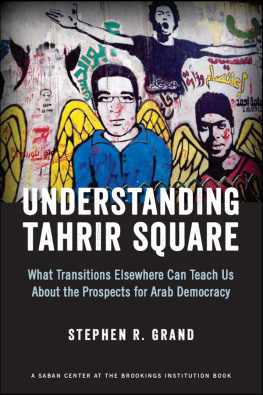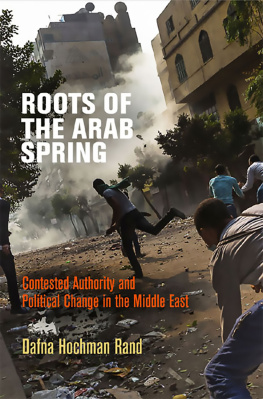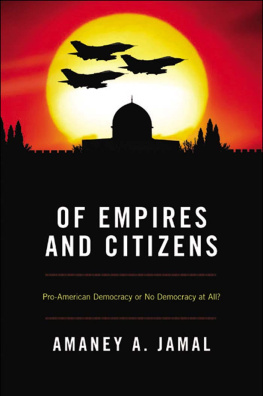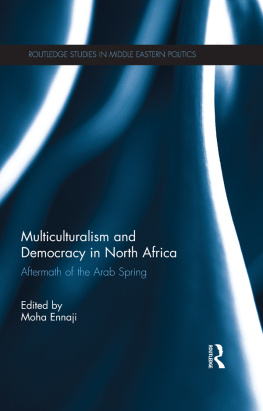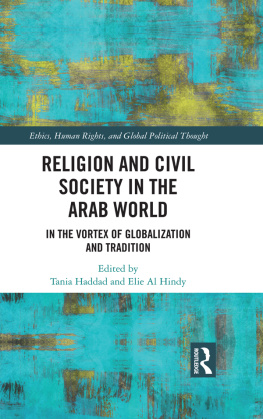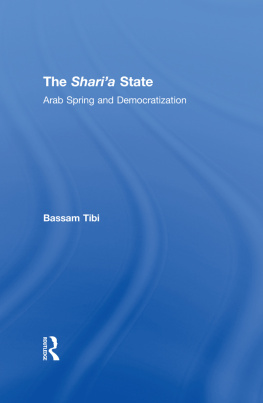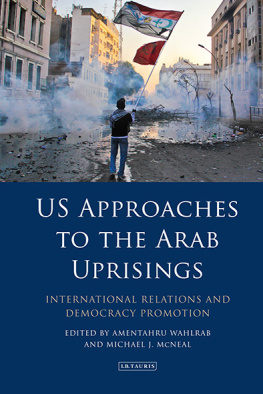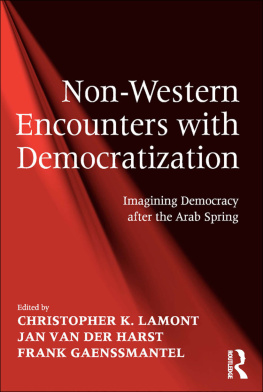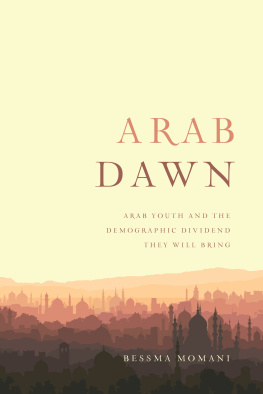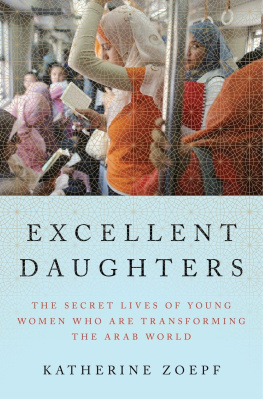Copyright 2014
THE BROOKINGS INSTITUTION
1775 Massachusetts Avenue, N.W., Washington, DC 20036
www.brookings.edu
All rights reserved. No part of this publication may be reproduced or transmitted in any form or by any means without permission in writing from the Brookings Institution Press.
The Brookings Institution is a private nonprofit organization devoted to research, education, and publication on important issues of domestic and foreign policy. Its principal purpose is to bring the highest quality independent research and analysis to bear on current and emerging policy problems. Interpretations or conclusions in Brookings publications should be understood to be solely those of the authors.
Library of Congress Cataloging-in-Publication data
Grand, Stephen R.
Understanding Tahrir Square : what transitions elsewhere can teach us about the prospects for Arab democracy / Stephen R. Grand.
page cm
Includes bibliographical references and index.
ISBN 978-0-8157-2516-9 (pbk. : alk. paper)
1. DemocratizationArab countries. 2. DemocracyArab countries. 3. DemocratizationCross-cultural studies. 4. DemocracyCross-cultural studies. 5. Arab Spring, 2010 6. Arab countriesPolitics and government21st century. I. Title.
JQ1850.A91G73 2014
| 320.917'4927dc23 | 2013050930 |
9 8 7 6 5 4 3 2 1
Printed on acid-free paper
Typeset in Sabon
Composition by Cynthia Stock
Silver Spring, Maryland
PREFACE AND ACKNOWLEDGMENTS
T his bookwhich seeks to garner lessons for the countries of the Arab Spring from the recent experiences with democratization of countries elsewhere around the globeis the product of a long intellectual journey. It began in 1990, when, while researching my dissertation, I had the good fortune to live in Prague immediately after Czechoslovakia's Velvet Revolution. I became fascinated by the rapid political and economic transitions that were reshaping Czech society from day to day. With totalitarian regimes crumbling all around, it was a period when people power and civil society were widely celebrated. However, as a budding political scientist, I struggled to understand the precise connection between the two and democratization. Did every democracy require a Chamber of Commerce and a League of Women Voters to be successful?
It was during this period that along with my long-time friend and now Brookings colleague William Antholis, I helped establish and served as executive director of a nonprofit organization, the Civic Education Project, that sent Western-trained university lecturers to teach at and help rebuild social science departments in the former Eastern bloc. What struck me most about the experience was the profound difference in attitudes toward authority between East and West. In their first encounter with Western-style education, our Eastern European students found most revolutionary not the new Western texts that we provided but our more informal, horizontal style of teaching. Many reported that they had never before been asked their own opinions or expected to take responsibility for a project from beginning to end. That made me curious about the connection between popular attitudes toward authority and democracy.
For the rest of the 1990s, I remained engaged in Eastern Europe, first as a staffer on the Senate Foreign Relations Committee, then as director of programs at the German Marshall Fund of the United States (GMF). In the latter role, I was heavily involved in grant making to new think tanks and civic groups throughout the region. I had the good fortune of being present at a gathering of Bulgarian, Romanian, and Slovak democracy activists (described briefly in the Slovak country case study in this book) that proved influential in the formation of the OK 98 civic movement, which helped oust Slovak strongman Vladimr Meiar from office. We then recruited one of the OK 98 leaders, Pavol Deme, to come work at GMF. He shared his experiences with the Croats and Serbs, in the latter case helping to shape the EXIT 2000 civic movement, which eventually unseated Slobodan Miloevi. Working with these civic movements was one of the highlights of my career. I was captivated by how like-minded citizens were able to come together to challenge authoritarian and semi-authoritarian regimes. Later, I also watched with interest as these movements struggled to figure out their roles after the dictator had fallento determine the part that civic groups could and should play in consolidating democracy.
Thanks to an International Affairs Fellowship with the Council on Foreign Relations in 200203, I had the luxury of being able to step away to think and write for a year about the lessons to be learned from the transitions, successful and unsuccessful, in the former Eastern bloc and their implications for political change in the Middle East. The ideas generated during that period deeply inform this work, and the Slovak and Serb country case studies that appear in draw heavily from an unpublished paper that I wrote during that year.
Following two years as founding director of the Aspen Institute's Middle East Strategy Group, which worked on Palestinian-Israeli issues, I was invited to be the director of Brookings's Project on U.S. Relations with the Islamic World, housed within the Saban Center for Middle East Policy. It was a fascinating opportunity to immerse myself in an entirely different region of the world. Traveling from Cairo to Qatar to Karachi to Kuala Lumpur, I came to recognize over time that the problems of the Muslim world had far less to do with religion than with poor governance. And, as I had witnessed in Eastern Europe, citizen movements were already taking shape to push for change. Then, in early 2011, as I was beginning to write this book in earnest, the Arab Spring erupted. A book that had been focused broadly on the problems of governance in the Muslim world was quickly transformed into one about the prospects for Arab democracy.
Writing about current events can be like trying to hit a moving targetone that seems to be moving especially rapidly in these tumultuous times. In the week or so before this book went to press, significant changes had already occurred in some of the countries that it covers: civic protests had ousted President Viktor Yanukovych in Ukraine, a corruption scandal had revived public demonstrations against Prime Minister Erdoan in Turkey, large-scale public protests had erupted against President Nicols Maduro in Venezuela, and the interim government in Egypt had resigned. None of these events, however, changes in any way the basic argument of the book. In fact, they are consistent with the pattern of events described in the country case studies presented here.
Many people gave me valuable advice and assistance in writing this book, although any errors and omissions are, of course, wholly my own. First, I would like to thank the many democracy activists, scholars, journalists, and politicians whom I met with during trips to Egypt and Tunisia in recent years. They are brave men and women who are living in a dangerous but pivotal moment in their countries history, and I appreciate greatly how generous they were with their time and how freely they shared their ideas, opinions, and perspectives on the events unfolding around them.
Second, I would like to thank those who read and commented on various drafts of the book, including Daniel Byman (the Saban Center's director of research), Thomas Carothers, Ivan Krastev, Michael O'Hanlon (the Brookings Foreign Policy program's director of research), Ted Piccone (the Foreign Policy program's acting vice president), and an anonymous outside reviewer. Their advice was invaluable in shaping the final product.

